28 Oct 2016 | Belgium, Europe and Central Asia, Kosovo, Latvia, Mapping Media Freedom, News, Russia
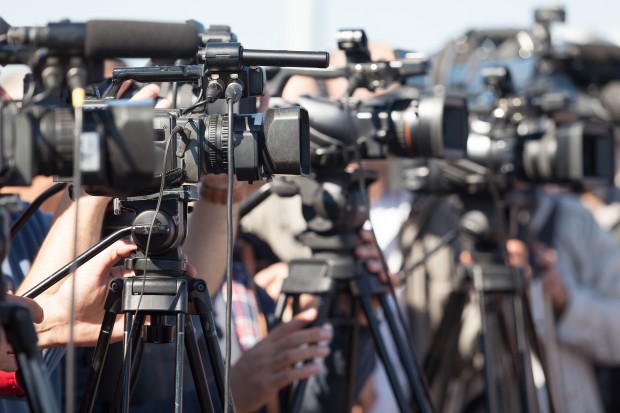
Each week, Index on Censorship’s Mapping Media Freedom project verifies threats, violations and limitations faced by the media throughout the European Union and neighbouring countries. Here are five recent reports that give us cause for concern.
Sergey Leleka, a columnist for the pro-government newspaper Komsomolskaya Pravda, suggested in an article on 24 October that independent journalists Anton Nosik and Sergei Parkhomenko should be “cured in gas chambers”.
According to Leleka, he wrote the article in reaction to jokes by Nosik and Parkhomenko about the Russian aircraft carrier Admiral Kuznetsov which passed through the English Channel emitting thick black smoke.
After the journalists complained to KP, the media outlet deleted the offending paragraph. However, Leleka’s original post is still available on his Facebook page.
A number of Belgian media websites, including De Standaard, RTBF, Het Nieuwsblad, Gazet van Antwerpen and Het Belang van Limburg were subject to a co-ordinated DDoS attack on 24 October, which temporarily shut the sites down.
A group that calls itself the Syrian Cyber Army claimed responsibility.
“We have attacked the Belgian media outlets that support the terrible actions of their Air Force in Syria,” the group said in a message to the newspapers. It wanted to “shame the Belgian authorities, which killed dozens of civilians in the village of Hassajik near Aleppo on 18 October”.
Belgium’s Federal Prosecutor’s Office has launched an investigation.
Editor-in-chief of Gazeta Express, Leonard Kerquki, received death threats after the airing of his documentary which mentions war crimes committed by the Kosovo Liberation Army.
The documentary, Hunting the KLA, aired in two parts and covers crimes and prosecutions from the war between Serbia and Kosovo at the end of the 1990s. The threats were made after the showing of the second part on 23 October.
The Journalist Association of Kosovo condemned the threats, as did the OSCE mission in Kosovo. “I condemn the threats and calls for violence against Kërquki. Freedom of expression must be upheld and respected in all circumstances,” said the head of Kosovo’s OSCE mission, Jan Braathu. “I call on rule of law authorities to investigate these threats immediately and bring the perpetrators to justice,” he said.
Ella Taranova, a senior producer for Russia Today, was detained by Latvian border guards on 21 October and later deported.
The incident occurred after Taranova was admitted to Latvia and to participate in a conference in a seaside suburb of Jurmala.
Taranova was blacklisted for being an employee of Russia Today, which the Latvian authorities see as a hostile propaganda organ of the Russian government. The head of Russia Today, Dmitry Kiselyov, is blacklisted from travelling to the European Union and other countries under EU sanctions imposed in the wake of Russia’s annexation of Crimea.
After her detention, Taranova told journalists: “I did not engage in any political activities nor do I intend to.” She added that she was unaware that she had been blacklisted since 2014 and had attended several such conferences prior to 2014.
At around 6am on 21 October, Russian Investigative Committee (SKR) officers entered and searched the apartment of Ksenia Babich, journalist and spokesperson for human rights international organisation Russian Justice Initiative.
According to Shelepin, SKR officers confiscated a notebook, phones and memory cards.
Babich was also asked to go to the SKR for questioning, Ilia Shelepin, a journalist and Babich’s acquaintance, wrote on Facebook. Babich believes the search is related to the case of Artyom Skoropadski, a press secretary of the Ukrainian organisation Pravyi Sektorwhich, which is banned in Russia.
21 Oct 2016 | Europe and Central Asia, Mapping Media Freedom, mobile, News, Russia
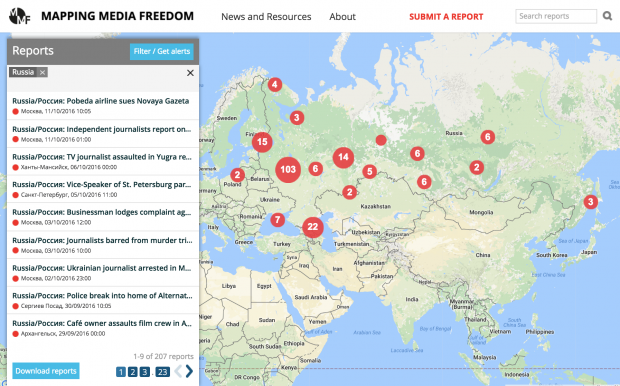
Russia’s recent elections have been described as “the dullest in recent memory”. But as Index on Censorship’s Mapping Media Freedom (MMF) project shows there was no shortage of media violations and claims of voter fraud.
On 18 September, the day of the vote, journalists across Russia were denied entry, attacked and arrested while attempting to monitor polling stations.
Rosbalt, a Russian news website, reported several instances of journalists – among them reporters for the BBC – being escorted out of a polling station by police officers and employees of the Vasileostrovsky district administration.
Further reports of journalists’ rights being violated in Saint Petersburg were widespread.
In Siberia, reporters were obstructed even from entering polling stations. A number working for Reuters were denied entry after officials at the location said they needed permission from local authorities but there is no law requiring this of international reporters. A voter claimed the counter used by a Reuters reporter to keep track of people voting was actually a radioactive device, and the reporter should be removed. This was not enforced.
Denis Volin, editor-in-chief of local news site Orlovskie Novosti, was barred from entering a polling station in Oryol. Volin was attempting to take photos of the polling station but officials demanded he stop. Journalists in Russia have a right to take photos and observe voting.
A journalist in Samara was illegally barred from a polling station despite having the necessary accreditation. When the journalist tried to stay for the vote count, officials demanded additional accreditation, which does not exist.
Journalist Dmitri Antonenkov and an activist with the Public Monitoring Commission, Vasili Rybakov, were both detained at a polling station in Ekaterinburg while investigating the illegal use of the Russian state coat-of-arms in polling stations. The pair were detained for two hours and their identification confiscated without return.
MMF Russian correspondent, Ekaterina Buchneva, said: “In general, attempts to bar journalists from polling stations were very common. We saw a lot of reports from Saint Petersburg and Moscow but the investigation by Reuters (they sent journalists to 11 polling stations across central and western Russia) proves that it was common for the rest of the country too, but, unfortunately, remained under-reported.”
Another of MMF’s Russian correspondents, Andrey Kalikh, said: “What is common is that journalists monitoring elections are often threatened if they reveal voter fraud at a polling station. There were dozens of cases in the 2011-2012 election campaign (state parliament and presidential elections) where registered journalists were kicked out, beaten up or otherwise harassed.”
Vladimir Romensky, a reporter for the independent TV channel Dozhd, for example, was involved in an altercation at a polling station in Moscow. Romensky was visiting the station to verify information about voter fraud. Earlier in the day a member of the polling board told Romensky that certain ballots were marked for the United Russia party. A man who refused to introduce himself denied access to Romensky and his crew. While Romensky was inquiring, a nearby police officer called armed guards from the station. The guards demanded Romensky’s paperwork and, despite having all his documents, the guards forced Romensky and his crew out of the location.
In another incident, Fontanka news correspondent Dmitry Korotkov was investigating the process of “carouseling”, a form of rigging elections where a group of selected people vote multiple times in different polling stations. When asked whether or not carouseling is a recent trend, Kalikh said, “No, it is not. It has existed before, the most cases were registered in 2011-2012. But the [Korotkov] case… is one of the most outrageous ones.”
Korotkov received information that voters with a special passport stamp were given multiple ballots at a polling station in the Kirov district. Korotkov was able to receive the stamp and received four different ballots at the station, even though he was not registered for the district. The polling official allowed Korotkov to sign as another voter.
Korotkov reported the incident and the polling board promised to investigate. Instead, Korotkov was detained by police officers on charges of illegally receiving ballots. The police interrogated Korotkov and his case was taken to court on 28 September. The journalist could be facing charges of using someone else’s ballot in a general election; his case is still under investigation.
Buchneva said: “The Fontanka reported that after questioning Korotkov and a suspect, who acted as an election official and gave Korotkov ballots named after another person, ‘the judge apparently had no more doubt, that Korotkov signed for another person not to vote illegally, as it was stated in the police report’. However, it is too early to say that the journalist will not be punished.”
Journalist Dmitri Antonenkov and an activist with the Public Monitoring Commission, Vasili Rybakov, were also both detained at a polling station in Ekaterinburg while investigating the illegal use of the Russian state coat-of-arms in polling stations. The pair were detained for two hours and their identification confiscated without return.
Winning 54% of the vote, United Russia now has a majority in the Duma, allowing them to change the country’s constitution without the approval of other parties.
6 Oct 2016 | Europe and Central Asia, Magazine, Russia, Student Reading Lists, Volume 45.03 Autumn 2016 Extras
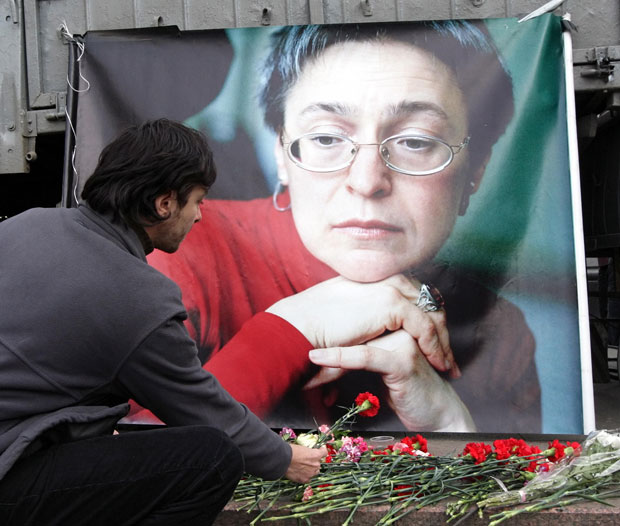
A man lays flowers near the picture of murdered journalist Anna Politkovskaya, during a rally in Moscow, Russia, 7 October 2009. CREDIT: EPA / Alamy Stock Photo
On 7 October 2006 investigative journalist Anna Politkovskaya was shot and killed in her apartment building in Moscow. In the latest issue of Index on Censorship magazine, Russian journalist Andrey Arkhangelsky reflects on Politkovskaya’s legacy 10 years on and looks at the state of journalism in the country today.
Politkovskaya, who worked for newspaper Novaya Gazetta, was known for her investigative reporting, particularly looking into the atrocities committed by Russian armed forces in Chechnya, and her criticism of the Putin administration.
She was a recipient of an Index on Censorship Freedom of Expression Award in 2002.
Ahead of the anniversary of her death, Index has compiled a reading list of articles written for the magazine both by Politkovskaya and about her. The collection also includes articles exploring media freedom in Russia and why the deaths are Russian journalists seem to go unnoticed and uninvestigated.
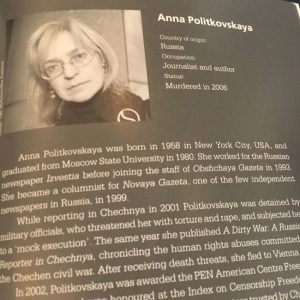
From The Cadet Affair: the Disappeared; an extract, written by Anna Politkovskaya, was published in the winter 2010 issue of Index on Censorship magazine
From The Cadet Affair: the Disappeared
December 2010; vol. 39, 4: pp. 209-210.
In 2010 Index published this extract from Nothing But the Truth: Selected Dispatches, a collection of Politkovskaya’s best writings. In this piece, she writes about the disappeared in Chechnya.
Standing Alone
January 2002; vol. 31, 1: pp. 30-34.
An interview with Politkovskaya who, at the time of publication, was living in Vienna, having been sent there for her own safety by Dmitry Muratov, editor-in-chief of Noveya Gazetta, after receiving threats from high-ranking officials who had been annoyed by her reports from Chechnya.
Codes of conduct
March 2012; vol. 41, 1: pp. 85-95.
Irena Maryniak considers the hidden network of relationships that continue to shape Russian society, undermine the rule of law and protect the status quo. In this article Maryniak highlights Politkovskaya’s concerns of the effects of the Kremlin’s reach and her work reporting on the atrocities inflicted on the Chechen population by the Russian armed forces and the Russian-backed administration of Akhmad Kadyrov.
Years of Living Dangerously
November 2009; vol. 38, 4: pp. 44-58.
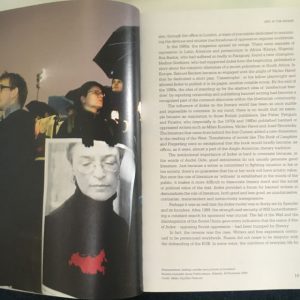
Grit in the engine by Robert McCrum, in the 40 year anniversary issue of Index on Censorship magazine.
Maria Eismont talks to Dmitry Muratov, editor of the newspaper Novaya Gazeta, at which Politkovskaya spent seven years as a journalist, about his struggle for press freedom and justice in Russia.
Stopping the Killers
November 2009; vol. 38, 4: pp. 31-43.
In this article Joel Simon, of the Committee to Protect Journalists, discusses how impunity is an urgent issue facing press freedom campaigners; and, after reflecting on Politkovskaya’s murder, outlines a roadmap for action
The Big Squeeze
February 2008; vol. 37, 1: pp. 26-34.
Edward Lucas explains how during Putin’s presidency media freedom has moved from the imperfect to the moribund, in an adaption from his book The New Cold War: how the Kremlin menaces Russia and the West.
Grit in the engine
March 2012; vol. 41, 1: pp. 12-20.
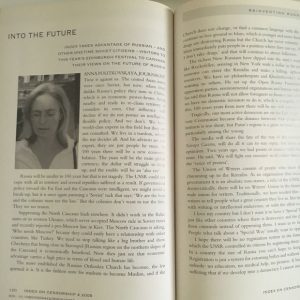
Into the Future; Index interviews Anna Politkovskaya in the winter 2005 issue of Index on Censorship magazine.
Robert McCrum considers Index’s role in the history of the fight for free speech, from the oppression of the Cold War to censorship online; and highlights how Politkovskaya turned to Index for help in making the west understand the dangers Russian journalists face.
Into the Future
November 2005; vol. 34, 4: pp. 120-125.
Index interviews Politkovskaya at the Edinburgh Festival, in which she discusses the future of Russia.
“We lost journalism in Russia”
September 2015; vol. 44, 3: pp. 32-35.
Andrei Aliaksandrau examines the evolution of censorship in Russia, from Soviet institutions to today’s blend of influence and pressure.
Power of the pen
December 2010; vol. 39, 4: pp. 17-23.
Carole Seymour-Jones celebrates the achievements of 50 years of fighting for authors’ freedoms and explains why there is so much more work to be done.
You can read Andrey Arkhangelsky’s article by subscribing to the magazine or taking out a digital subscription from anywhere in the world via Exact Editions (just £18* for the year). Each magazine sale helps Index on Censorship fight for free expression worldwide.
*Will be charged at local exchange rate outside the UK.
Magazines are also on sale in bookshops, including at the BFI and MagCulture in London, News from Nowhere in Liverpool and Home in Manchester; as well as on Amazon and iTunes. MagCulture will ship to anywhere in the world.
23 Sep 2016 | Azerbaijan, Azerbaijan News, Cyprus, Europe and Central Asia, France, Mapping Media Freedom, mobile, News, Russia

Each week, Index on Censorship’s Mapping Media Freedom project verifies threats, violations and limitations faced by the media throughout the European Union and neighbouring countries. Here are five recent reports that give us cause for concern.
The right-wing National Front (FN) party of France held its summer conference in Fréjus earlier this month. On 16 September the party refused to allow access to the independent media website Mediapart and the Quotidien television programme. The party has denied access to Mediapart in the past due to its critical reporting on the party.
Journalists’ societies of Radio France, le Monde, le Figaro, Libération, le Parisien, les Echos, Courrier International, AEF, France 2, France 3, TF1, Itélé/Canal+ denounced the ban and said they hoped it would not happen again. The FN has refused to grant access to journalists in the past despite this being against the law.
Regardless of the party’s attempt to keep Mediapart from the summer conference, the website claims they hired a freelance writer to cover the event.
Vladimir Romensky was removed by police from a Russian polling station on 18 September. Romensky is a reporter for the independent television channel Dozhd and was sent to the polling station to investigate potential voter fraud. He was responding to rumors that ballot stuffing had occurred at the site.
When Romensky attempted to enter he was approached by a man who refused to introduce himself and did not allow Romensky or his camera crew to access the polling station. A nearby police officer then intervened and demanded to see Romensky’s documents. Despite having all the necessary documents for his camera crew and himself, the police officer called armed guards and pushed the crew out of the station.
Dmitry Korotkov, a reporter for the Russian news site Fontanka, was arrested in St Petersburg on 18 September while investigating voter fraud.
Korotkov was looking into information about carousel voting, which occurs when an organised group of voters travels to different voting districts to repeatedly vote, even though they are not registered in that district. Fontanka discovered that voters were given four ballots at a certain polling station after revealing a special stamp on their passports to polling officials.
Korotkov was able to obtain the passport stamp and received four ballots at the designated polling station even though he was not registered in the specific district. In response, the polling official offered for him to sign as another voter.
Korotkov revealed to the polling official who he was and the fraud that was occurring. The official promised to investigate the situation and called the police, however Korotkov was detained instead. They charged him with illegally obtaining ballot papers.
At around 2am on 19 September, crime reporter Dina Kleanthous’ car was set on fire by an unknown arsonist.
Kleanthous is a reporter for the online news site Reporter Online. She believes the act is not personal, but a response to her work. Kleanthous had recently been receiving threats regarding a story she was covering.
Dunja Mijatović, a representative for the Freedom of Media in the OSCE, said: “This blatant attempt to coerce a journalist who is reporting on news of public interest is simply unacceptable, I urge the authorities to investigate this incident thoroughly and bring to justice those responsible.”
Hilal Mammadov, the editor-in-chief of the independent newspaper Tolyshi Sado, was summoned by police on 19 September. The newspaper covers the ethnic minority of Talysh in Azerbaijan.
Mammadov is a former political prisoner, sentenced to five years in prison in 2013 on spurious charges of “illegal selling of drugs”, “high treason”, and “incitement to national, racial, social, and religious hatred and hostility”. Mammadov was pardoned in March 2016.
After being summoned on 19 September, Mammadov claims the police asked him whether he was a part of a “secret opposition“ and he was forced to give the names of his family to the officials.






